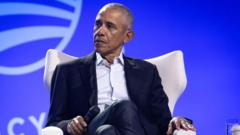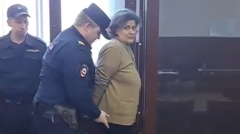In a decisive move, President Zelensky of Ukraine has invited Donald Trump to visit the country to observe the horrors of war firsthand, prior to any negotiations with Russia, amidst increasing military aggression and international calls for a ceasefire.
Zelensky Calls on Trump to Visit Ukraine Amid Ongoing Conflict Before Potential Deal with Russia

Zelensky Calls on Trump to Visit Ukraine Amid Ongoing Conflict Before Potential Deal with Russia
Ukrainian President urges former US leader to witness the war's impact firsthand as missile strikes escalate
Zelensky emphasized the importance of experiencing the Ukrainian plight directly during an interview with CBS's 60 Minutes, urging Trump, "Please, before any kind of decisions, come to see people, civilians, warriors, hospitals, churches, children destroyed or dead." His invitation came just hours after Russian missile strikes devastated the city of Sumy, resulting in significant casualties with 35 dead and numerous wounded.
The missile attacks, which Russia claimed were aimed at Ukrainian military personnel, have raised alarms over civilian safety, with Kyiv officials demanding accountability for allowing such a gathering. The U.S. administration, under Trump's leadership, has shown commitment to seeking an end to the prolonged war through negotiations, though skepticism remains regarding the effectiveness of these efforts.
Earlier on the same day, Trump expressed shock over the attack but only described it as a "terrible" incident, leaving international officials and observers questioning the U.S.'s stance and response to Russian atrocities. The United Nations condemned the missile strikes, reinforcing the prohibition of attacks against civilians in accordance with international humanitarian law.
European leaders echoed these sentiments, with Germany and France demanding immediate action to halt Russia's ongoing aggression, characterizing the attacks as war crimes. Historical context shows that the conflict has persisted since 2014, following Russia's annexation of Crimea, continuing to take a heavy toll on Ukrainian lives.
Despite the urgency highlighted by global leaders, it is yet to be seen whether Trump will accept Zelensky's invitation and what that may mean for the trajectory of U.S.-Ukraine relations.
The situation remains dynamic, demonstrating the gravity of the conflict and the considerable impact of international diplomacy in these pivotal moments.
The missile attacks, which Russia claimed were aimed at Ukrainian military personnel, have raised alarms over civilian safety, with Kyiv officials demanding accountability for allowing such a gathering. The U.S. administration, under Trump's leadership, has shown commitment to seeking an end to the prolonged war through negotiations, though skepticism remains regarding the effectiveness of these efforts.
Earlier on the same day, Trump expressed shock over the attack but only described it as a "terrible" incident, leaving international officials and observers questioning the U.S.'s stance and response to Russian atrocities. The United Nations condemned the missile strikes, reinforcing the prohibition of attacks against civilians in accordance with international humanitarian law.
European leaders echoed these sentiments, with Germany and France demanding immediate action to halt Russia's ongoing aggression, characterizing the attacks as war crimes. Historical context shows that the conflict has persisted since 2014, following Russia's annexation of Crimea, continuing to take a heavy toll on Ukrainian lives.
Despite the urgency highlighted by global leaders, it is yet to be seen whether Trump will accept Zelensky's invitation and what that may mean for the trajectory of U.S.-Ukraine relations.
The situation remains dynamic, demonstrating the gravity of the conflict and the considerable impact of international diplomacy in these pivotal moments.






















